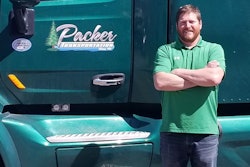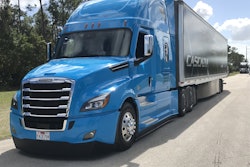With increasing levels of goods movement and rising pressure for cleaner transport, trucking is facing growing demand for near-zero or zero-emission solutions. And in order to ensure the success of solutions like electric vehicles, fleets and utilities will need to learn to work together on everything from physically building out charging infrastructure to electricity rate design.
This will require their relationship to evolve from one focused on transactions to one focused on transformation of the U.S. freight industry.
 By Jessie Lund, Senior Associate with Rocky Mountain Institute’s Industry program, is a study team member for the North American Council of Freight Efficiency’s Guidance Reports on electric vehicles.
By Jessie Lund, Senior Associate with Rocky Mountain Institute’s Industry program, is a study team member for the North American Council of Freight Efficiency’s Guidance Reports on electric vehicles.While there are certainly similarities between commercial carriers and utilities that may help open a dialogue between the two, there is still work to be done to ensure things don’t get lost in translation. And like learning a new language, some tricks of the trade will go a long way.
Get out there and simply talk with folks. Yes, it will be awkward and frustrating at first, but stick with it. There’s no better way to learn something new — whether a language or an industry — than from the experts.
Pay attention to patterns. Just as French words tend to have pronunciation patterns similar to English, so too are there many patterns one can glean from one industry to the next, particularly given the diversity of operations and business models of both the trucking and utility worlds. That is, fleet managers don’t need to become experts on every single utility or rate structure out there, but they should understand what sort of charges go into electric bills (e.g., volumetric charges, demand charges, time-of-use charges) and how to minimize these expenses. Similarly, utility account managers may not know every detail of a fleet’s duty cycle (at least not initially), but they should understand general concepts like range, dwell time, and payload, and how they impact the feasibility of currently available electric vehicles.
Watch out for false cognates. While there will be many patterns and similarities to help decipher unfamiliar words, phrases, or concepts, be sure to understand where these may be misleading. For example, the term “load” means very different things to a fleet versus a utility: one referring to payload and the other to the demand at any one time on the electric grid. Learn these differences early to avoid confusion and miscommunication.
Supplement with media. Just as you might try to watch TV shows or read articles in the language you’re trying to learn, so too should you immerse yourself in educational and networking experiences curated by those of the opposite group. Consider registering for a trade group newsletter or joining a working group focused on a shared topic but coordinated through the other industry (e.g., Smart Electric Power Alliance’s Electric Vehicle Working Group and Fleet Electrification subcommittee).
Embrace humility. You will make mistakes and you will be caught off guard. There’s no way around it, and that’s okay. But learning to take these missteps in stride and not take yourself too seriously will help others open up to you, which will allow you to do the same in return.
Embracing these tips will have you speaking fluent utility in no time so that you can lead the way when it comes to successful electric vehicle deployments. And remember, if you find yourself getting stuck, you can always reach for NACFE’s guidance reports on the topic, which are almost as good as a pocket dictionary.
For a look at similarities between fleets and utilities, see this other blog on Rocky Mountain Institute’s website. At RMI, Jessie Lund provides research and analytics to support a climate-aligned decarbonization pathway for the heavy transport sector and has authored Guidance Reports on electric truck charging infrastructure and Confidence Reports on solar panel technology for trucks.












